So, you’ve just bought a new A/V receiver or soundbar. Congratulations! But now it’s time to make all the connections, and you’ve got some decisions to make. Life wasn’t always this complicated.
In the olden days, when dinosaurs ruled the earth, a simple coaxial cable got the job done for all connections. But we’re no longer technological cave men. Instead, we have a ton of accessories, like Blu-Ray players, game consoles, cable boxes, and A/V receivers.
Thankfully, HDMI has taken on the role that coax used to occupy. You’re just running more cables. But when it comes to A/V receivers or soundbars, you can run into some issues. Specifically, standard HDMI doesn’t support two-way audio transmission.
So if your signal comes through your receiver and into your TV, it can’t run back out again. For that, you’ll need to use an HDMI ARC (Audio Return Channel) cable. Alternatively, you can use a fiber optic cable, usually referred to simply as optical. Which one is best? Here’s a quick overview.
HDMI ARC and Optical Basics
HDMI ARC and optical cables both share the same purpose. They both transmit multi-channel audio from one device to another. So far, so good. The only significant difference in terms of function is that an optical cable won’t transmit video. But this shouldn’t be an issue, since you’ve already got video on your HD television.
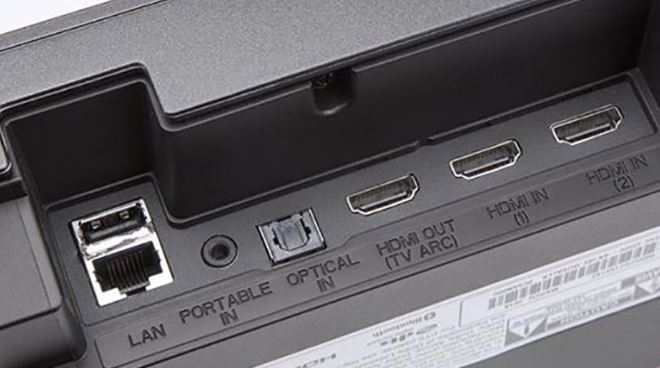
The main difference between HDMI and optical is in their material construction. HDMI cables are primarily made of copper, which is a standard material for any electronic cable. Copper is cheap, it’s easy to produce, and we’ve been manufacturing with it for centuries.
On the downside, it’s susceptible to electromagnetic interference. Optical cables, on the other hand, are made of fiber optic strands, which are made of glass. These are relatively expensive to manufacture. However, they transmit the signal via light, rather than an electrical current. This makes them impervious to outside interference.
We shouldn’t have to mention this, but we will: make sure your equipment is compatible. For example, some soundbars don’t support HDMI sound. If your TV doesn’t support optical sound, you’ll need to run an optical cable directly from your source.
This might seem like a good workaround, but it’s actually not. Since the signals are travelling on separate paths, the audio and the video might be out of sync. In other words, before you buy a soundbar or A/V receiver, make sure it will work with your TV.
Audio Quality
For most home entertainment systems, optical cables are going to get the job done. They support surround sound with up to 5.1 channels. That’s good enough for any soundbar. But what if you’re an audio nut, and you use a 7.1-channel surround sound system?
In that case, an optical cable isn’t going to get the job done. Also, optical cables don’t even support TrueHD, DTS HD, or Dolby Digital Plus. That’s quite the limitation for a more advanced soundbar, much less a full stereo system.
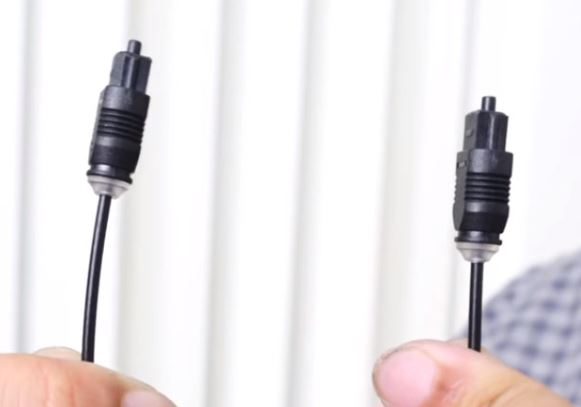
The problem is that while optical cables are virtually immune to interference, they have a limited capacity. To get the most out of your powerful stereo system, you’re going to need an HDMI ARC connection. HDMI ARC supports virtually any sound format. You get support for Dolby Atmos, Dolby Digital Plus, TrueHD, and DTS HD. This will get you the best possible quality from your Blu-Ray discs or a modern game console.
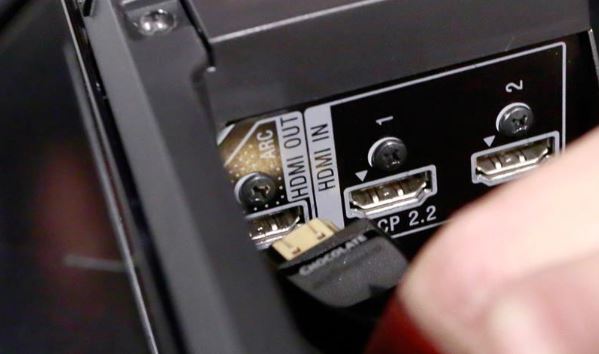
The one major feature HDMI ARC doesn’t support is 7.1-channel surround sound. For that, you’ll need a further update. HDMI eARC – the “e” stands for “enhanced” – is capable of 7.1-channel surround sound. It also provides even higher bandwidth.
Most modern televisions, even expensive ones, output compressed sound at lower quality than the input. This can limit your sound quality regardless of whether or not you’re using HDMI ARC. HDMI eARC uses Ethernet technology to output at the same quality as the input.
In other words, you can enjoy rich, uncompressed audio without any jury-rigging or latency. Only a handful of devices currently support eARC technology. If you want to go this route, check your hardware specs carefully before you buy.
Video Quality
Video quality only applies to HDMI cables, but it’s still worth mentioning. The reason is that not all HDMI cables offer the same quality. If you need 4K video, an HDMI 2.0 cable will get the job done. However, you’ll be limited to 60 frames per second.
On the other hand, an HDMI 2.1 cable will offer 120 frames per second in 4K. You can even watch 8K video at 60 frames per second! This is essential for most VR systems.
In addition, there’s an obvious secondary point to be made relating to video. Because an optical cable isn’t compatible with video, it means you need more cables. Buying an optical cable and a cheap HDMI cable can be costlier than investing in a quality HDMI ARC cable.
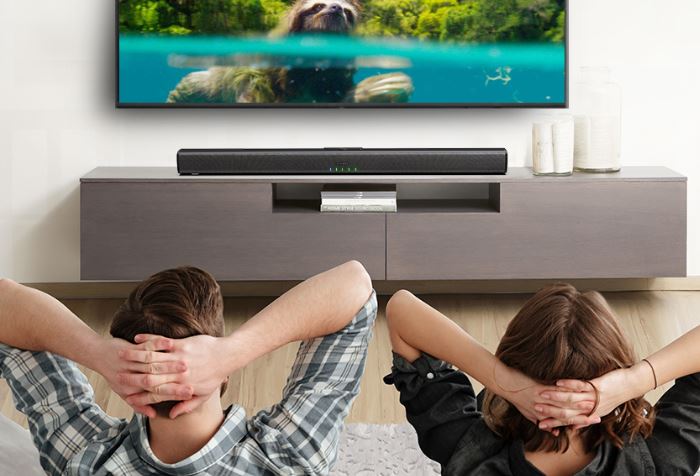
Cable Length
Depending on your needs, cable length may or may not be an issue. If your TV and A/V receiver are right next to each-other, it’s a non-issue. Moreover, if you have a custom media room or whole-house audio system, it’s a significant issue.
Before we go on, we should point out that you should always use the shortest possible cable for your application. Regardless of cable type, you’re going to see some loss of signal the longer the cable is.
That said, video signals typically degrade faster than audio signals on HDMI. The reason is that the video uses the vast majority of the bandwidth. There’s also less tolerance for signal loss for video than there is for audio.
Knowing that, if you’re running separate cables to separate speakers, you’ll want to use the same length cable. The reason for this is that different cable lengths can skew the signal. The bigger the difference, the harder time your A/V receiver will have detecting the proper clock signal.
An HDMI cable has a maximum run length of approximately 15 meters (about 50 feet). The reason for this is twofold. First off, there’s the interference issue we already talked about. However, that’s not the whole story.
The other problem is that an HDMI signal uses an extremely low voltage, only 5 volts. As a result, even a high-quality cable with very low resistance can only carry the signal so far. After 15 meters, there’s going to be noticeable degradation.
Optical cables, depending on their quality, have a maximum length of 10 to 30 meters (about 33 to 99 feet). The reason they still have a maximum length is that no material is perfectly transparent. Eventually, the light signal will start to degrade.
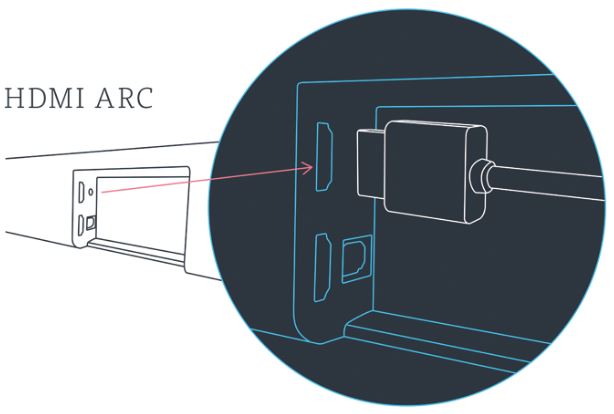
The Case for HDMI ARC
The best case for HDMI ARC cables is if you have an A/V controller or soundbar. Simply put, you’ll get better quality audio than you would with an optical cable. This alone makes HDMI ARC a clear favorite.
In fact, HDMI ARC also enables CEC technology. We haven’t talked about this much. CEC allows you to use the same remote for all your HDMI ARC-connected devices. With that in mind, if you’re not using an external set of speakers, a standard HDMI cable might be a better option.
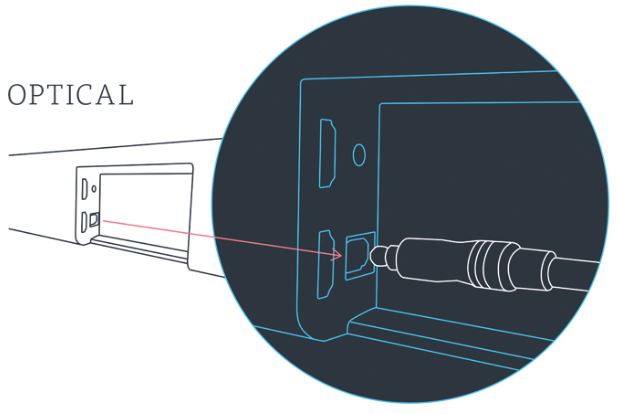
The Case for Optical
The best case for optical is if you have compatibility issues. For example, you might have an older A/V receiver or soundbar that doesn’t support HDMI ARC. In that case, optical may be your only choice. However, optical is a better choice for long runs.
If you’re wiring an audio system for your entire house, it’s definitely a better option. Finally, an optical cable is advisable if you’re getting a lot of electromagnetic interference. Of course, in that case, you should probably check your equipment to see what’s causing the interference.
Final Verdict
As you can see, both of these technologies have their own applications. To begin with, HDMI ARC is the best choice if you want the absolute best audio quality possible. It supports all the latest audio formats, and lets you use the same remote for all devices. Moreover, it helps you eliminate tangled cables and clutter.
On the other hand, optical cables still offer decent sound quality. Not only that, but they’re immune to interference, and they’re suitable for very long runs. At the end of the day, which type of cable you need will depend on what you’re looking for.
Meet Ry, “TechGuru,” a 36-year-old technology enthusiast with a deep passion for tech innovations. With extensive experience, he specializes in gaming hardware and software, and has expertise in gadgets, custom PCs, and audio.
Besides writing about tech and reviewing new products, he enjoys traveling, hiking, and photography. Committed to keeping up with the latest industry trends, he aims to guide readers in making informed tech decisions.

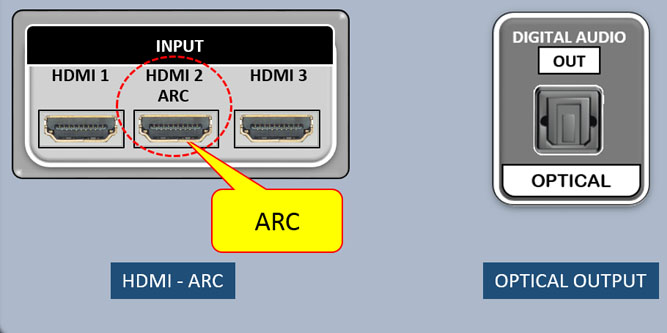
Hi. I have an L G 55″smart T V. Recently I brought a Boat Avante sundbar. But I couldn’t connect soundbar with my tv through HDMI arc. Now I am using via bluetooth.
Kindly advice me how can I enjoy soundbar with fullswing via HDMI arc.
I always wAnted clearance regarding this matter, thank you
Dear Tech Guru,
I have an MI TV 4A with HDMI Arc and 3.5mm sound out put only and I want to connect with 5.1 sound system with RCA input only.
How to connect both? Please help me.
I have JBL bar studio 2.0 and Samsung smart TV, that has two HDMI (one of them ARC) and optical audio out. Problem is I hook my TV with PS4 and Computer (TV as projector) using both HDMI. So, I have no choice to use optical. I believe sound quality is not that significantly different, at least in my opinion as I am not a sound nerd. I am just using basic system , not using 7.1 like mentioned in the article.
Dear Tech guru,
I have a Bose Lifestyle Home Entertainment System which only supports HD. I plan to buy a 4K TV. This means that I need to connect the TV separately and provide a separate Audio connection to the BOSE receiver. Can I achieve this by buying a HDMI splitter one for the 4K TV and another one for the receiver?
Firstly, I want to thank you for this well written article. For a technical piece,your style of writing made reading this material a pleasure and,in my opinion,the best article I have ever read on the topic of HDMI ARC vs Optical applications.
I really like the HDMI ARC solution through the CEC system (ANYNET+ on my Samsung TV. I have a modest Samsung HW-FM45C soundbar with a Samsung 8500s rear speaker kit. For me,it is more than I need. I am using a 2.0 Rocket Fish 3 foot cable,so as to be compliant.
The issue that I ran into,was the installation of a new DVR by my cable service.
Once the new box was installed, the CEC connection was lost. I tried everything to restore it.
As it turned out,this model of DVR emits random voltage that interferes with the ANYNET network!
Good news though. A Lindy CEC-LESS adapter placed on the end of the HDMI cable leading from the DVR to the TV. eliminated the interference by blocking the 13th pin in the HDMI plug.
It would do the same thing for any other connected device that may be causing CEC issues.
It caused me so much consternation and wasted time that I thought I could possibly help others having a similar issue.
Anyway,just another tool for the toolbox.
I have a Manhattan t3-r recorder which uses HDMI connection.
I intend to get a new Samsung TV and JBL soundbar, which has HDMI (ARC) in addition to optical connections.
Would I be able to utilise both the Soundbar and the Manhattan at the same time via their respective HDMI sockets (Ideal)? Or would the soundbar have to be connected via the optical cable, so the Manhattan recorde can play through its HDMI lead?
I have Android TV with HDMI ARC port. I am having LG 5×1 music system but this system do not have HDMI ARC port. It has Optical Port.
I can get TV sound via my 5×1 home theater system. But I am not able to get Video from DVD system to TV. Kindly help
Very useful article, especially for beginners.
I just added a Samsung HW-T650 soundbar to our Samsung LED TV. It is working great but my only issue is that when you first turn the TV on it wants to switch sources to the HDMI ARC that the soundbar is connected to. So we have to manually change the source back the the HDMI that our Directv is connected to. I haven’t been able to find a setting or anything that will stop it from doing that.
Great help sir. Thank you for an awesome explanation! Even for a lamen such as myself, I got it!
I have a new Vizio 5.1 M-series surround sound system with HDMI ARC capability. My one year old Sony Bravia TV has this option as well. However, no matter what I do, I cannot get sound out of the Vizio until I disconnect the HDMI ARC and use the Optical connection. I have tried everything possible in the settings, also referring to Sony’s website. What on earth am I doing wrong? The TV even states that external audio is occurring, but it’s not. Any clue? Thanks!
This is a timely article for me. Like others have implied above, would one be able to use a HDMI Arc outlet in my LG smart tv using HDMI cable into my Yamaha 5.1 home theatre (older system) without a HDMI-arc dedicated port?
I ended up using both the HDMI cable AND an optical cable to transmit the sound from my tv. However, I keep getting this shut down of the sound system especially when I connect my satellite TV. Not all the time but always during switches between my various gadgets connected to the home theatre. What am I not doing correctly? Would having both hdmi cable and optical cable be a problem?
Dear Tech Guru,
Does the type of HDMI cable matter? I am using HDMI from my Denon AV amp’s ARC to Sony Bravia KD65 tv ARC. When I switch to Netflix on Sony, no sound is coming from my 5.1 speakers! Is it a cable problem? Should it be a 2.0 or 2.1 cable? Right now it’s a freebie, cheapie. Also can I connect the ARC for video AND optical cable for sound at the same time? Thanks.
Thank you for great explanation, it’s a big help. Question I have is I have a Samsung 65″Q70T connected via HDMI arc to a Denon 1600h AVR with 4 ceiling speakers wired to AVR. All sounds great. However is there anyway I can still use the Samsung remote to control sound volume as it has a nice button for microphone so I can raise volume, change channel, etc. Or do I lose that since the AVR is controlling sound now. Thank You.
I’m an odd ball, I’m using a optical splitter to run 2 Samsung soundbars. My thought was I’d have a fuller sound and one soundbar is 2.0 and the other is a 3.1. It does sound good when volume is matching. I just bought a hdmi splitter so I can run the 2 soundbars with arc. Hopefully it will work and mabee sound a touch better. My question is will this damage anything doing what I’m doing. 3 years and no issues yet just really rich full sound.
@Brian Rains
Were you successful going from your tv hdmi arc out to (2) separate sounds bars that are hdmi arc capable. I want to do the exact same thing.
Cleared this up for me wonderfully! Thank you!